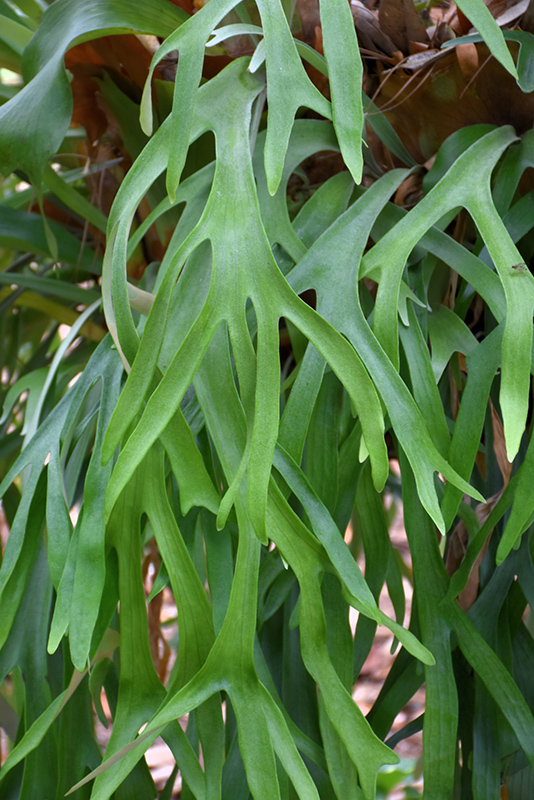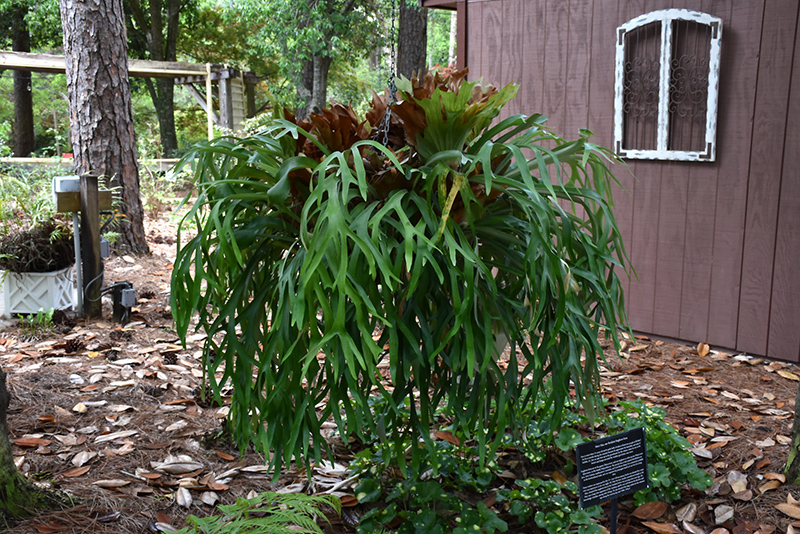Plant Finder
Height: 3 feet
Spread: 3 feet
Sunlight:
![]()
![]()
Other Names: Elkhorn Fern, Platycerium alcicorne
Description:
An evergreen, epiphytic fern with distinctive fronds that resemble the forked antlers of a stag; leathery, gray-green fronds grow outward from the crown; water crowns regularly and do not allow to dry out; great for indoor baskets or containers
Features & Attributes
Staghorn Fern is primarily valued in the home for its broadly spreading habit of growth. Its attractive large deeply cut lobed leaves emerge light green, turning grayish green in color throughout the year.
This is an herbaceous evergreen houseplant with a spreading, ground-hugging habit of growth. Its relatively coarse texture stands it apart from other indoor plants with finer foliage. This plant should not require much pruning, except when necessary to keep it looking its best.
Planting & Growing
When grown indoors, Staghorn Fern can be expected to grow to be about 3 feet tall at maturity, with a spread of 3 feet. It grows at a slow rate, and under ideal conditions can be expected to live for approximately 10 years. This houseplant performs well in both bright or indirect sunlight and strong artificial light, and can therefore be situated in almost any well-lit room or location. It does best in average to evenly moist soil, but will not tolerate standing water. The surface of the soil shouldn't be allowed to dry out completely, and so you should expect to water this plant once and possibly even twice each week. Be aware that your particular watering schedule may vary depending on its location in the room, the pot size, plant size and other conditions; if in doubt, ask one of our experts in the store for advice. It is not particular as to soil type, but has a definite preference for acidic soil. Contact the store for specific recommendations on pre-mixed potting soil for this plant.
There are many factors that will affect the ultimate height, spread and overall performance of a plant when grown indoors; among them, the size of the pot it's growing in, the amount of light it receives, watering frequency, the pruning regimen and repotting schedule. Use the information described here as a guideline only; individual performance can and will vary. Please contact the store to speak with one of our experts if you are interested in further details concerning recommendations on pot size, watering, pruning, repotting, etc.
-- THIS IS A HOUSEPLANT AND IS NOT MEANT TO SURVIVE THE WINTER OUTDOORS IN OUR CLIMATE --
Disclaimer - Rutgers Landscape & Nursery Plant Finder is an online resource representing many of the varieties that we carry over the course of the season, and is intended for informational purposes only. Inventory varies seasonally, so we cannot guarantee that every plant will be in stock at all times - please contact Rutgers directly for current availability.


